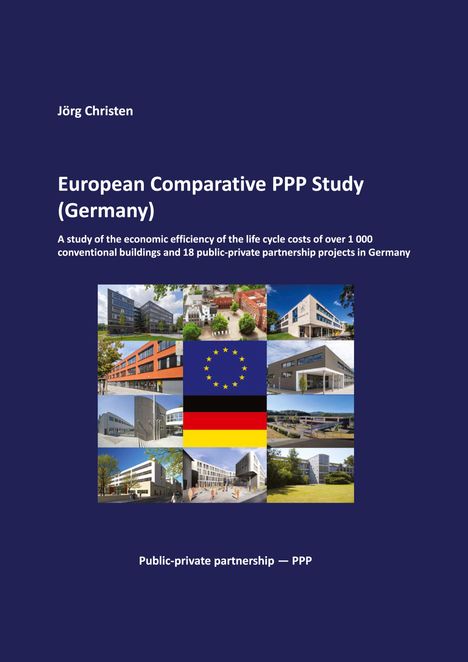Jörg Christen: European Comparative PPP Study (Germany), Kartoniert / Broschiert
European Comparative PPP Study (Germany)
Buch
- A study of the economic efficiency of the life cycle costs of over 1 000 conventional buildings and 18 public-private partnership projects in Germany
lieferbar innerhalb 2-3 Wochen
(soweit verfügbar beim Lieferanten)
(soweit verfügbar beim Lieferanten)
Aktueller Preis: EUR 24,98
- Verlag:
- tredition, 04/2024
- Einband:
- Kartoniert / Broschiert, Paperback
- Sprache:
- Englisch
- ISBN-13:
- 9783384196729
- Artikelnummer:
- 12127248
- Umfang:
- 116 Seiten
- Gewicht:
- 360 g
- Maße:
- 297 x 210 mm
- Stärke:
- 8 mm
- Erscheinungstermin:
- 10.4.2024
- Hinweis
-
Achtung: Artikel ist nicht in deutscher Sprache!
Weitere Ausgaben von European Comparative PPP Study |
Preis |
|---|---|
| Buch, (Germany), Gebunden, HC gerader Rücken kaschiert, Englisch | EUR 26,98* |
Klappentext
European comparative public-private partnership study Key result of the German projectsWhen compared with conventional benchmarks, the life cycle costs of the 18 PPP projects studied are between 17% and 35% lower over 25 years, and construction and operating quality are often above average. The PPP municipalities rate the construction and operating performance at 1.7 (1 = very good, 5 = unsatisfactory). The construction process of these is highly efficient: The new build costs are between 15% and 20% and the construction times are 30% lower than BKI. The reliability of costs and deadlines is near-optimal. The operating performance figures for maintenance are remarkably good: In comparison with the maintenance budgets in the KGSt data, which are more than 50% below the target for moderate maintenance levels, the 18 PPP projects have above-average budgets. The management of maintenance is organised very efficiently: Service levels define the standards that must be maintained throughout the contract for all key components. Users are required to comply with response and correction times and charges are automatically applied if targets are not met. The standard is part-specific maintenance calculations with upper cost limits. In addition, there are reserve accounts for fast access to funds, which is described by building administrations as a quantum leap. As a result, PPP maintenance management offers a reliable opportunity for significantly better residual values and avoids maintenance backlogs, which, according to the KfW local authorities panel 2024, amount to 186 billion at the municipal level.
For energy management, the PPP costs are between 15% and 30% lower than KGSt and BKI. Heat consumption is 41% to 61% below the VDI benchmarks (2014). Consumption levels have thus far remained 11% below the maximum quantities guaranteed at the start of the contract. This shows that the more the PPP company shares in the savings achieved, the more energy savings are made. This is expected to save a total of 25 000 tonnes of CO2 over 25 years across ten projects.
This comparatively good PPP performance is largely due to the contractual incentive structures: Guaranteed caps on costs, deadlines and consumption volumes, protection against interest rate risks in financing, fee reductions if performance is poor, a share in savings, employee salaries linked to contractual performance, operator liability and the PPP companies interest in making a profit. The PPP lifecycle approach thus lies at the core area of the 2016 Nobel Prize in Economics, which Oliver Hart and Bengt Holmström received for their work on principal agent theory and incentive structures in incomple-te long-term contracts.
For the 18 PPP projects, the expected savings in life cycle costs over 25 years add up to between 298 and 328 million euros. Extrapolating this to the over 300 PPP projects currently under way in Germany, this represents savings of 8 billion. This is a strong argument not only for launching new PPP projects, but also for further evaluations. As this analysis and the results of the PPP school study (2019) demonstrate, the comparison of conventional and PPP methods yields a large number of recommendations, for example for organising maintenance and energy management efficiently, ensuring sustainable infrastructure and avoiding future investment backlogs.
Anmerkungen:
Bitte beachten Sie, dass auch wir der Preisbindung unterliegen und kurzfristige Preiserhöhungen oder -senkungen an Sie weitergeben müssen.

Jörg Christen
European Comparative PPP Study (Germany)
Aktueller Preis: EUR 24,98


